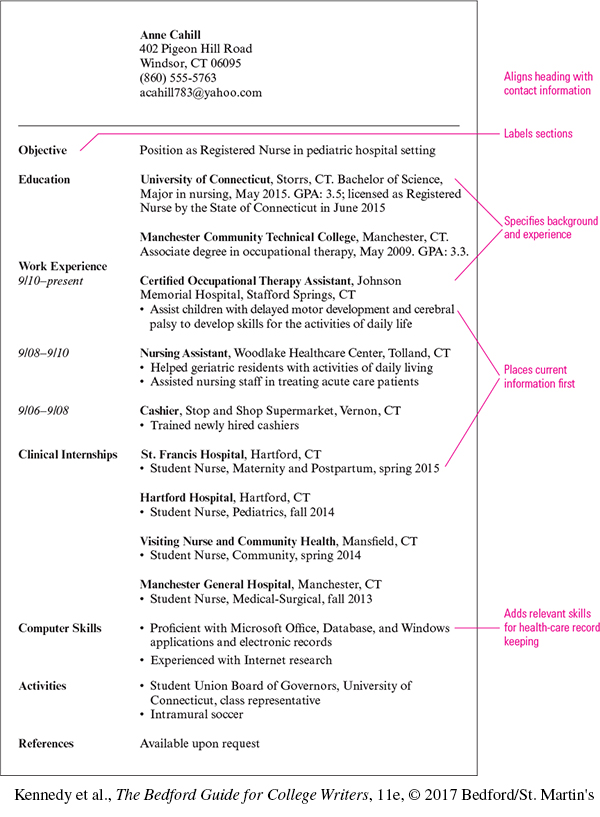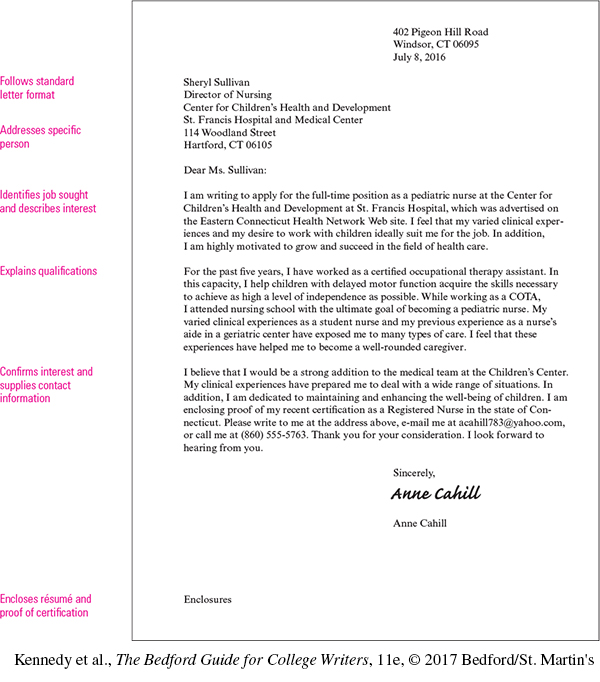Résumés and Application Letters
The most important business correspondence you write may be the résumé and letter you use to apply for a job. In any economic climate—but especially in a weak one with reduced job prospects—your materials should be carefully developed and crafted. They need to reflect as many applicable skills and experiences as possible, including your summer, campus, part-time, or full-time employment as you attend college. First, prepare for job prospects by developing opportunities systematically, well before graduation:
Turn to campus career services as well as local library or community resources to investigate job opportunities and career strategies.
Consider internships or volunteer posts relevant to your goals.
Attend preprofessional or career-oriented workshops or gatherings.
Network with workplace and professional contacts to learn about your future options and prospects.
Remain flexible, too. Instead of looking only for the single job title you want, consider what other experiences might build your skills on your way to that job. For example, if you are in a public health program and want to join a major city health department, by all means gain expertise so you can pursue that job despite the city’s recent budget cutbacks. But also consider rural or statewide positions, hospital outreach, companies with employee health programs, or the growing field of senior care. Take advantage of serendipity—the surprise that offers a new or unexpected option.
Finally, as opportunities arise, apply your college writing experience to the workplace in order to draft and revise effectively. Direct, persuasive, correct prose can help you stand out from the crowd.
Résumés
For more on résumé format and another student sample, see section F in the Quick Format Guide.
In a résumé, you present yourself as someone qualified to excel at a job and be an asset to the organization. Job seekers often have copies of a single résumé on hand, but you may want to customize yours for each application if you can easily print attractive copies. Either way, keep it to one page unless you have extensive relevant work experience.
A résumé is highly formatted but allows many decisions about style, organization, and appearance. A typical résumé consists of a heading and labeled sections that detail experience and qualifications. Highlight labels with underlining, boldface, or larger type. Within a section, use brief, pointed phrases and clauses, not complete sentences. Use action verbs (supervised, ordered, maintained) and active voice whenever possible. Arrange information to please the eye; use the best paper and clearest printer you can. (See Figure 17.1.)

For electronic applications, you may need a résumé in several forms: a text file for attaching to an e-mail, an electronically readable version for a company to scan into its database, or a Web version for posting on your site or a job site. Format these versions carefully so that recipients can easily read what you supply. Turn to your campus career center for résumé samples and advice about alternate formats.
Heading. The heading is generally centered (or otherwise pleasingly aligned) on the page with separate lines for your name; street address; city, state, and zip code; phone number; and e-mail address.
Employment Objective. This optional section allows personnel officers to see at a glance your priorities and goals. Try to sound confident and eager but not pompous or presumptuous.
Education. This section is almost always included, often first. Specify each postsecondary school you’ve attended, your major, your date of graduation (or expected graduation), and your grade point average (if it reflects well on you). You can also add any awards, honors, or relevant course work.
Experience. In this key section, list each job, most recent first. You can include full- and part-time jobs. For each, name the organization, your position, your responsibilities, and the dates you held the job. Describe any involvement in unusual projects or responsibility for major developments. Highlight details that show relevant work experience and leadership ability. Minimize information unrelated to the job you’re seeking.
Skills. List any special skills (data processing, technical drawing, multiple languages) that aren’t obvious from your education and work experience.
Activities. You can specify either professional interests and activities (Member of Birmingham Bricklayers Association) or personal pursuits (skiing, hiking, needlepoint) showing that you are dedicated and well-rounded.
References. If a job advertisement requests references, provide them. Always contact your references in advance to make sure they are willing to give you a good recommendation. For each person, list the name, his or her organization and position, and the organization’s address and phone number. If references have not been requested, you can simply note “Available on request.”
As you prepare your résumé, and possibly your professional Web site, also consider your electronic trail and workplace etiquette. A future employer may well assume that anything you write at work is company correspondence, without personal rights to privacy, and that anywhere you go online at work will represent or be subsidized by the company. That same employer is unlikely to be amused by your confessional Facebook page or your party photos. Though you might consider social media materials personal, they may seem very public to an employer who checks your background and your credibility. Your electronic presence should correspond with the reliable-future-employee presence you wish to project.
Learning by Doing Reflecting on Your Working Life and Goals
Learning by Doing Reflecting on Your Working Life and Goals
Reflecting on Your Working Life and Goals
What are the differences between a job, a vocation, and a career? Do you have any of these three now? If so, what does the position entail? What do you like about it, and what are its drawbacks or limitations? If money were no object, what might you do instead? Would you view this as a job, a vocation, or a career? Why? Write a brief reflection in which you respond to these questions.
Application Letters
For more on letter format and another sample, see section F in the Quick Format Guide.
When writing a letter applying for a job, follow all the guidelines for other business letters. As you compete against others, your letter and résumé are all the employer has to judge you on. Your immediate objective is to obtain an interview, so read any advertisement critically.
What qualifications are listed? Ideally, you should have them all. If you lack one, try to find something in your background that compensates, some similar experience in a different form.
What else can you tell about the organization or position from the ad? How does the organization represent itself? (Check its Web site.)
How does the ad describe the ideal candidate? As a team player? A dynamic individual? If you feel that you are the person this organization is seeking, portray yourself this way in your letter.
Your letter should spark your readers’ interest, convince them you’re qualified, and motivate them to interview you. If possible, address your letter to the person who screens applicants and sets up interviews; you may need to call the organization to find out this person’s name. In the first paragraph, identify the job, indicate how you heard about it, and summarize your qualifications. In the second paragraph, expand on your qualifications, highlighting key information on your résumé. Add details if necessary to show that you’re a better candidate than others. In the third paragraph, restate your interest in the job, ask for an interview, and let your prospective employer know how to reach you. (See Figure 17.2.) If you get an interview, follow up with a thank-you note. The note may reemphasize your qualifications and strong interest in the position.
Learning by Doing Planning a Job Application
Learning by Doing Planning a Job Application
Planning a Job Application
Look for a job advertisement for a position or in a field that might interest you. Check the newspaper, a professional publication, or an organization’s Web site. First, analyze the ad to identify what type of applicant it seeks, noting qualifications, experience, ambitions, or other expectations. Then list the kind of information an applicant might supply in response. Discuss your analysis with a classmate or small group to see whether your interpretations match.

Learning by Doing Planning for Your Future Career
Learning by Doing Planning for Your Future Career
Planning for Your Future Career
Make an appointment with your advisor or your school’s career counselor, and with his or her assistance, figure out what classes you must take to pursue your future career. (If you are undecided about a career, you might discuss possible options with the advisor or counselor.) What volunteer work, internships, or other activities would help you build skills necessary for the career or help you stand out from other job candidates? If you plan to attend graduate school, what steps do you need to take to ensure the greatest chance of acceptance into a graduate program?